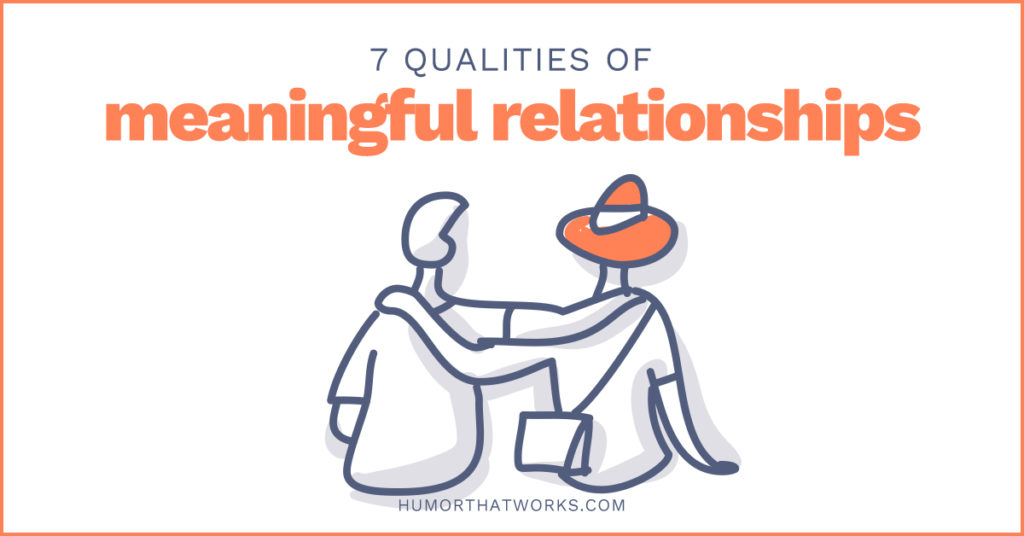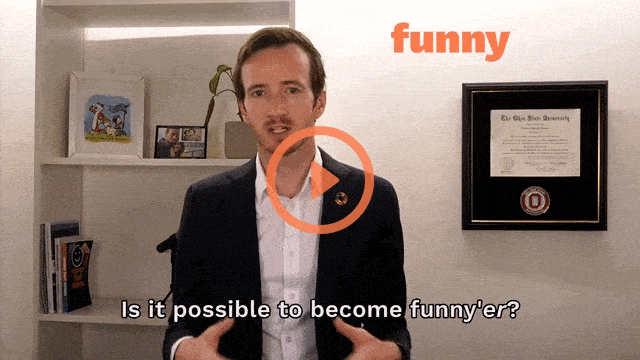In order to learn how to build relationships, it’s important to understand what makes for a meaningful relationship. That’s the topic of this next post in our relationship series. See below for our other blogposts in this series – The Importance of Relationships, 7 Types of Work Relationships and the 5 Stages of Relationships.
A meaningful relationship is characterized as a relationship that is of personal significance, is healthy, caring, and long-lasting, and is one we couldn’t do without. It’s with a person who helps us grow, supports and encourages us and is there for us when we need them. This is what it means to be in the Continue stage, and is indicative of a mentor/mentee work relationship or life friends.
In order to be in a meaningful relationship, it must exhibit seven key characteristics, aka the 7 Qualities of Meaningful Relationships.
1) Communication
What: Communication is the expression and receiving of the thoughts, ideas and feelings of another person.
Why: It’s critical to relationships because it’s the only way people connect. It’s instrumental to the other qualities listed below and is often the first thing to go when a relationship starts to deteriorate.
How: The key to strong communication is expressing yourself clearly and honestly and fully listening to the other person, seeking to understand what they are communicating (both verbally and non-verbally).
2) Respect
What: Respect means to hold someone else, their ideas and existence, in high esteem and in a positive light.
Why: Without respect for oneself and the other person, a relationship cannot thrive with honesty and interdependence.
How: To show respect, follow the Platinum Rule: treat others how THEY want to be treated.
3) Honesty
What: Honesty means your words match your actions–you are truthful about what you do.
Why: Honesty is critical to meaningful relationships because it is one of the pillars of trust, and without it, the relationship is likely to fail.
How: Being honest involves communicating clear expectations of yourself and the other person, admitting to any mistakes and expressing how you honestly feel.
4) Dependability
What: Dependability includes integrity, and means your actions match your words–you do what you say what you’re going to do.
Why: Dependability is the second pillar of trust and is a crucial show of support for the other person.
How: To be dependable, keep your commitments and promises and be present for the other person, both physically and mentally.
5) Empathy
What: Empathy is the vicarious experience of the thoughts, feelings and emotions of another person.
Why: A step beyond sympathy, empathy is the ultimate sign of support for the other person because you truly walk in their shoes and experience what they experience.
How: As Stephen Covey describes it: seek first to understand, then to be understand. Focus on truly understanding what the other person is going through and feeling before trying to fix it, respond to it or ignore it.
6) Interdependence
What: Interdependence is when two independent people come together to create a strong relationship.
Why: Interdependence is stronger than a co-dependent relationship because both people are coming from a solid foundation. This has a powerful effect and leads to “the whole being great than the sum of the parts.”
How: Interdependence comes from thinking Win-Win in every scenario–find ways both independent people can benefit from each decision.
7) Purpose
What: Every strong relationship has a purpose–a reason that the two people are connecting, associating or being involved with each other. It could be for career perspective, guidance, socializing, love or a thousand other things.
Why: The purpose helps to dictate what is expected and appropriate of the relationship; without it, a relationship isn’t worth the time or effort because it provides no value to at least one of the participants.
How: Defining a purpose includes evaluating why you are in a relationship and aligning with the other person the reason the relationship exists.
7 Qualities of Meaningful Relationships
There is more depth to each of these qualities, but the above synopsis gives you a starting point to understanding what it takes to have a meaningful relationship. By working on each of these qualities, you can grow your relationships into the Continue stage and reap the benefits of meaningful relationships.
If you would like to learn more, checkout our other blogposts on The Importance of Relationships, 7 Types of Work Relationships and the 5 Stages of Relationships. Remember, having meaningful relationships at work improves your workplace satisfaction by up to 96 percent (and keeps you sane).




I enjoyed this article very much and had no problem with the Platinum Rule. Thank you.
What is this platinum rule business? What ever happened to the Golden Rule, that is to treat others the way you would like to be treated yourself, which is what Jesus said. Otherwise most parts of the article are okay.
Sure are a lot of meaningless “relationships” out there.
You appear to describe things at such a superficial level I suspect you are fresh off one of your recent cool-aid mixers provided by Steven Covey or Dale Carnegie. The issue I take exception with the most, aside from honesty and integrity piece not being more generally the same is the same one mentioned by another commentor. Treating people how THEY would like to be treated lends itself to manipulation to get what YOU want and it is very sociopathic in nature. The “Platinum” rule has overtaken the “golden” rule (not the one of who has the most gold).;-). If you truly ’empathize’ with the individual and ‘understand’ from their perspective you can treat them how YOU would like to be treated and the best outcome could be realized. However, I wonder if any of you “newbies” to the rule of human interaction/behavior have ever dug deep enough beneath your own egotistical need to introduce something “new” and “innovative” sell your wares to understand how the PLATINUM RULE is f’n up society in a major way? Treat sociopathic assholes like Queens and Kings, the way they want to be treated, never helped society 1 bit!
Doubt your able to post this comment cause it conflicts with your superficial and shallow depth of understanding on the whole subject.
Re. ‘the Platinum Rule: treat others how THEY want to be treated’. Is immediately conflicted in your next section ‘Honesty’. If someone thinks they ought to be treated like royalty being sycophantic is dishonest.
I like the rest of the article
That’s true, you have to practice the Platinum Rule within reason. Part of Honesty is also being able to tell the other person what you will and won’t do.
I love reading here.
Pingback: What To Look For In A Social Circle | mumble in the jungle
A relationship keeps going if both parties are able to express their feelings in a clear manner.
Using a soft tone and nice words is also good for a healthy relationship.